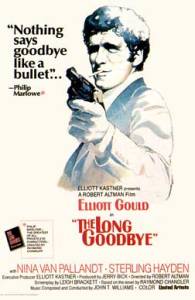 In the storied tradition of film-noir comes another film in the canon and yet another depiction of Raymond Chandler’s Phillip Marlowe. However, the world with which Robert Altman places his private eye is far different than any place the character has ever inhabited before. Whereas another neo-noir such as Chinatown followed the storied tradition of noir in many ways, The Long Goodbye is often more of a satire than a new addition to the genre.
In the storied tradition of film-noir comes another film in the canon and yet another depiction of Raymond Chandler’s Phillip Marlowe. However, the world with which Robert Altman places his private eye is far different than any place the character has ever inhabited before. Whereas another neo-noir such as Chinatown followed the storied tradition of noir in many ways, The Long Goodbye is often more of a satire than a new addition to the genre.
Elliott Gould as Phillip Marlowe has the smoking down like Bogart or Dick Powell, the garb, and even the car, but his environment is the 1970s, making him quite anachronistic, and that seems to be just fine with Altman. He subverts the genre by placing Marlowe in a world he does not seem to fit in and yet he himself does not seem to question it.
The girls next door are hardly your typical girls-next-door. The police station looks like it could be out of The Rockford Files. John Williams and Johnny Mercer’s title song pops up in all places from the elevator to the car radio. His tail Harry is an incompetent joke. Passing cars give the security guard time to practice his best movie star impressions. Marlowe as well proves he is not much of an animal guy with a cat that he loses and a dog that hates him.
The drama is not much better in that regard. Two murders take place (including the death of a friend), which are later followed by a man’s suicide and his beautiful wife fleeing the country. All the while, on the case Marlowe is scrounging around and coming up mostly empty. The cops bring him in, an unhappy thug roughs him up over some money, and he can get very little out of the drunken writer Roger Wade (Sterling Hayden) or his wife (Nina van Pallandt) before she disappears.
By now we know better than to compare this Marlowe to any predecessor. He gets smashed about by the waves trying to stop a suicide and ends up in the hospital after getting bowled over by a car. He seemingly does his best detective work in a stupor, and he somehow escapes a chilling confrontation where everyone is removing their clothes. All these scenarios make little sense and even with the twisted conclusion to the mystery, there still is no explanation for the way things are. Altman gives us a surprising end but no answers as we watch Gould dance off into the distance playing a mini harmonica. Marlowe can often be heard saying, “It’s okay with me.” It’s the story of his life and if he is fine with it, I suppose his audience will just have to accept it too, even if they do not quite like it.
4/5 Stars

Really looking forward to watching this, but I wanted to read the book first. From your description I don’t think it would matter. May have to put this to the top of my Netflix queue.
LikeLike
That would be really interesting to read the source material. I unfortunately have not.
LikeLike
That would be really interesting to read the source material. I unfortunately have not.
I have. It’s arguably Chandler’s best. Much recommended.
LikeLiked by 1 person
I love this movie despite its several loose moments: clearly Altman let the cast improvize some of the dialogue, and there are times when Gould’s improvizations of Marlowe-style snappy lines are pretty embarrassing. But I think it’s a great — and valid — new vista on the Marlowe world. And Gould’s portrayal of Marlowe seems likewise a perfectly valid one . . . although I’d suggest that this Marlowe is indeed an inhabitant of the 1970s rather than an anachronism transported into that decade. In 1970s terms, Marlowe is a straight (this is long before “straight” meant “non-gay”) doing his best to get along with a world that’s sort of left him behind . . .
My 2c-worth.
LikeLiked by 1 person
Thanks for the analysis on Gould’s Marlowe! It definitely is an interesting twist of the archetypal Film-Noir. Gould is somewhat of an acquired taste, but this is still enjoyable for how odd it is at times.
LikeLike
One of my favorite neo-noirs. I love how Altman deconstructs the ’40s detective story (he does an equally interesting job “deconstructing the classic western in McCabe & Mrs. Miller). Arthur Penn’s Night Moves is another ’70s noir that does a fantastic job playing with the conventions of the genre.
LikeLike
Pingback: Night Moves (1975): Arthur Penn’s Neo Noir | 4 Star Films